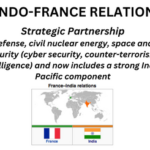Joint Statement on India-Uzbekistan Virtual Summit: Central Asia and India

Prime Minister of the Republic of India Shri Narendra Modi and President of the Republic of Uzbekistan H.E. Mr. Shavkat Mirziyoyev co-chaired a Virtual Summit between India and Uzbekistan on 11 December, 2020
- Both leaders emphasized on the need for bilateral and global cooperation to continue the fight against the COVID-19 pandemic including development and distribution of effective vaccines and other medicine; reaffirmed India’s continued commitment to support Uzbekistan in this regard.
- Both sides stressed to achieve mutually identified target of USD 1 billion for bilateral trade; both sides stressed to work towards an early conclusion of Bilateral Investment Treaty
- The Indian side confirmed the approval of USD 448 million of Line of Credit to be extended by India for four developmental projects in Uzbekistan in the fields of road construction, sewerage treatment and information technology.
- Both Sides agreed to further strengthen cooperation between the law enforcement agencies and special services of the two countries, including under the framework of the Uzbekistan-India Joint Working Group on Counter-Terrorism.
- Bilateral civil nuclear cooperation, in particular, the conclusion of the bilateral agreement between the Global Centre for Nuclear Energy Partnership, India and the Agency for Development of Nuclear Energy, Uzbekistan.
- The Sides reaffirmed that the United Nations must play a central role in maintaining global peace and security. They agreed to strengthen their cooperation, including through mutual support, in the United Nations and other international and regional organizations. The Sides called for comprehensive reform of the UN structures including the Security Council with expansion in both categories of membership.
LEARNING FROM HOME/ WITHOUT CLASSES/ BASICS
CENTRAL ASIA AND INDIA
Modern Central Asia consists of five nations: Kazakhstan, Kyrgyzstan, Tajikistan, Turkmenistan and Uzbekistan. Recently there has been a remarkable upsurge in India’s efforts to engage with Central Asian countries; to safeguarding and expanding India’s energy supplies in order to sustain economic growth and to keep a check on the rise of radical Islamist groups that may pose a risk to India’s security.
IMPORTANCE OF THE CENTRAL ASIA REGION
Energy Security:
- The Central Asian countries are bestowed with substantial hydrocarbon fields, natural gas and oil reserves which makes them an attractive point for investment.
- Kazakhstan is the leading manufacturer of uranium and has enormous gas and oil reserves as well.
- Uzbekistan is also rich in gas, and is a significant local producer of gold together with Kyrgyzstan.
- Tajikistan has enormous hydropower potential and Turkmenistan has the fourth largest gas reserves of the world.
Regional Security:
- To tackle the challenges of terrorism, drug trafficking and arms smuggling and Keeping a check on the rise of radical Islamist groups
Strategic Location:
- Geographically, the strategic location of Central Asian countries makes them a bridge between different regions of Asia and between Europe and Asia.
Commercial:
- Central Asia offers a relatively untapped market for Indian consumer goods. Indian tea and pharmaceutical industries have acquired a foothold in the Central Asian market.
- The rapid economic development of Central Asia has sparked a construction boom and development of sectors like IT and tourism.
On February 1 2018, India joined Asghabat Agreement, a four nation group consisting of Turkmenistan, Iran, Oman and Uzbekistan which envisages setting up of an international transport and transit corridor linking Central Asia with the Persian Gulf to significantly ramp up trade and investment. Accession to the agreement will diversify India’s connectivity options.
INDIA AND UZBEKISTAN
Uzbekistan has a prominent position in the region ; crucial to India in terms of presenting a potentially big market for Indian exports. In return, New Delhi benefits through raw materials as well as oil, gas and uranium. But the lion’s share of this comes from engagement with Kazakhstan due to its oil exports. Uzbekistan was also the venue of the historic First India-Central Asia Dialogue of Foreign Ministers in January 2019, which was also saw participation by Afghanistan. Defence cooperation between India and Uzbekistan has been growing lately. In November 2019 they held their first Joint Field Training Exercise, Dustlik-2019, focusing counter-insurgency operations. Bilateral documents in the field of military education and military medicine were also signed.
Both India and Uzbekistan are members of Shanghai Cooperation Organisation (SCO) and Tashkent is the headquarters of the SCO’s Regional Anti-Terrorist Structure (RATS). Trade and economic engagement are set to rise with the operationalization of Chabahar port and full implementation of the International North-South Transport Corridor (INSTC). Joint efforts of India and Uzbekistan on connectivity can have positive effect on the mutual trade turnover.
Lal Bahadur Shastri Centre for Indian Culture working under Indian Council for Cultural Relations (ICCR), was established in Tashkent in 1995 and has been a household name in Uzbekistan for its cultural activities.




0 Comments